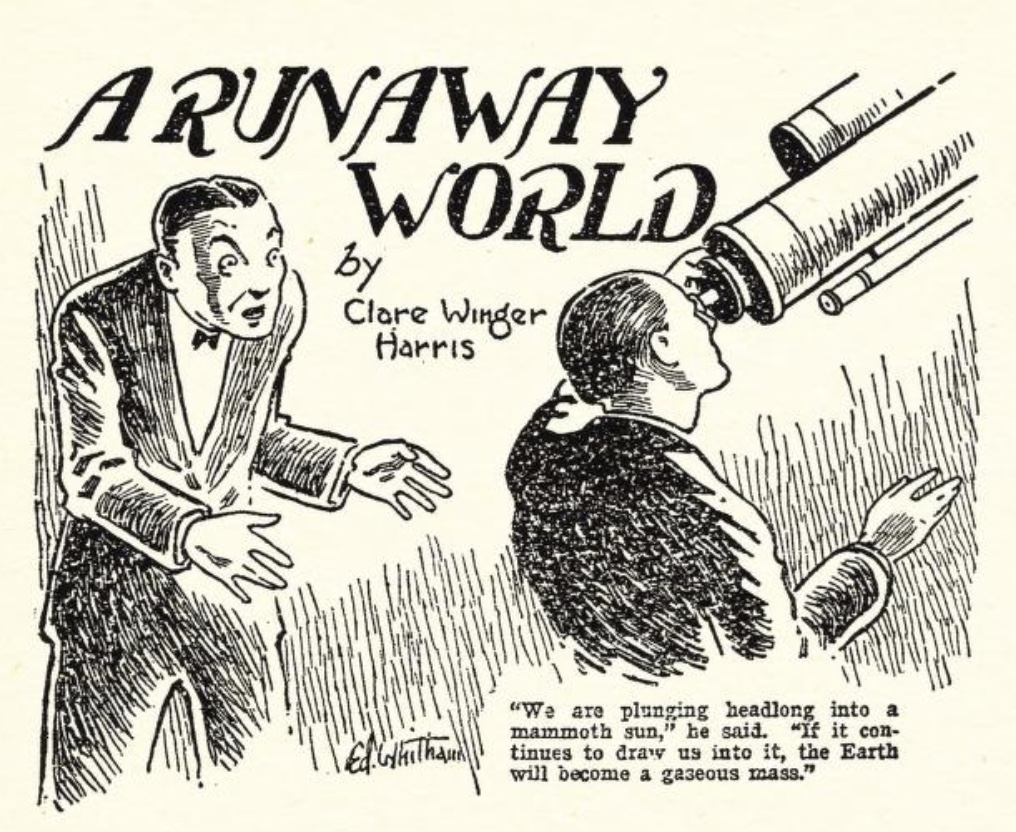A RUNAWAY WORLD (6)
By:
December 11, 2022

HiLoBooks is pleased to serialize “A Runaway World,” by Clare Winger Harris. This story, her first, appeared in the July 1926 issue of Weird Tales; it entered the public domain in 2022.
ALL INSTALLMENTS: 1 | 2 | 3 | 4 | 5 | 6 | 7 | 8.
I should gain nothing by a detailed account of the flight of Earth through interplanetary space. Seconds, minutes, hours, days, weeks and months lost their significance to the isolated inhabitants of a world that had gone astray. Since time had always been reckoned by the movements of the Earth in relation to the sun there was no way to ascertain the correct passage of time. True, a few watches among the members of our group aided in determining approximately the passage of time in accordance with the old standards to which we had been accustomed. How we missed the light of day, no being can imagine who has never experienced what we lived through.
“Is the moon still with us?” I asked one time of Marden.
“I can not ascertain definitely,” he replied. “With no sunlight to reflect to Earth from its surface, it has eluded my observation so far, but I have imagined a number of times that a dark object passes periodically between us and the stars. I shall soon have my observations checked up, however. How I do miss radio communication, for doubtless such questions are being discussed over the air pro and con! We are still turning on our axis, but once in every twenty-seven hours instead of twenty-four. I don’t understand it!”
Oscar spent virtually all his time in the observatory. He did not always reward the rest of us with his discoveries there, as he was naturally taciturn. When he spoke it was usually because he had something really worth while to tell us.
“You remember I told you that the Earth continued to rotate, though slowly, on its axis even though it no longer revolved around the sun,” he said on the day we completed approximately five months of our interstellar wandering. “I also told you that should such a calamity befall the Earth as its failing to rotate, the waters would pile and and cover the continents. I have not told you before, but I have calculated that the Earth is gradually ceasing to rotate. However, we need not fear the oceans, for they are solid ice. I may also add that with this decrease in our rate of rotation there is a great acceleration in our onward flight. In less than a month we shall be plunging straight forward at many times our present rate of speed.”
It was as Oscar Marden had predicted, and in a few weeks the positions of the heavenly bodies showed that Earth was hurtling straight onward at the speed of light. At the end of two years our provisions were running very low in spite of the scanty rations which we had allowed. The telescope had become our only solace for lonely hours, and through its gigantic lens we became aware of what the future held for us. I flatter myself that I was the first to whom Oscar revealed his fearful discovery.
“Tell me what yon see,” he said, resigning his seat at the eyepiece to me.
“I see a very large star,” I replied, “considerably larger than any near it.”
He nodded. “I will tell you something that need not be mentioned to the seven below, Jim, because I can trust you to keep your head. For some weeks past I have known that we are headed for that star as straight as a die!”
I must have paled. for he glanced at me apprehensively and added, “Don’t allow yourself to worry. Remember complete resignation to whatever fate is in store for us is the only way to meet natural catastrophes.”
“Yes,” I agreed. “Man may be the master of his own fate as regards his relation to his fellowmen. but he has no hand in an affair like this!”
“None whatever,” smiled Marden, and I thought it seemed the very nicest smile in the world, except possibly Vera’s.
“If we are destined to plunge headlong into this sun that lies directly in our path, and is undoubtedly what is drawing us onward, you may rest assured that human suffering will be less prolonged than if we pass this sun and continue to fathom the abyss of the eternal ether. If we were to plunge into it, the Earth would become a gaseous mass.”
“Tell me,” I pleaded, “is it because we are not rotating that we are threatened with this awful disaster?”
“Yes, I believe so,” he answered slowly. “If we had continued to rotate we might have escaped the powerful drawing force of this sun.”
RADIUM AGE PROTO-SF: “Radium Age” is Josh Glenn’s name for the nascent sf genre’s c. 1900–1935 era, a period which saw the discovery of radioactivity, i.e., the revelation that matter itself is constantly in movement — a fitting metaphor for the first decades of the 20th century, during which old scientific, religious, political, and social certainties were shattered. More info here.
SERIALIZED BY HILOBOOKS: James Parker’s Cocky the Fox | Annalee Newitz’s “The Great Oxygen Race” | Matthew Battles’s “Imago” | & many more original and reissued novels and stories.
